So you aimed for highly competitive summer programs but didn’t get in? Don’t worry. Colleges aren’t simply interested in whether you attended a summer camp. What truly matters is what you gained from the experience—how it reflects your intellectual drive and growth. In fact, there are plenty of excellent alternatives that can demonstrate the same (or even more) about your academic curiosity.
Today, we’ll focus on alternative activities that foster and showcase intellectual curiosity.
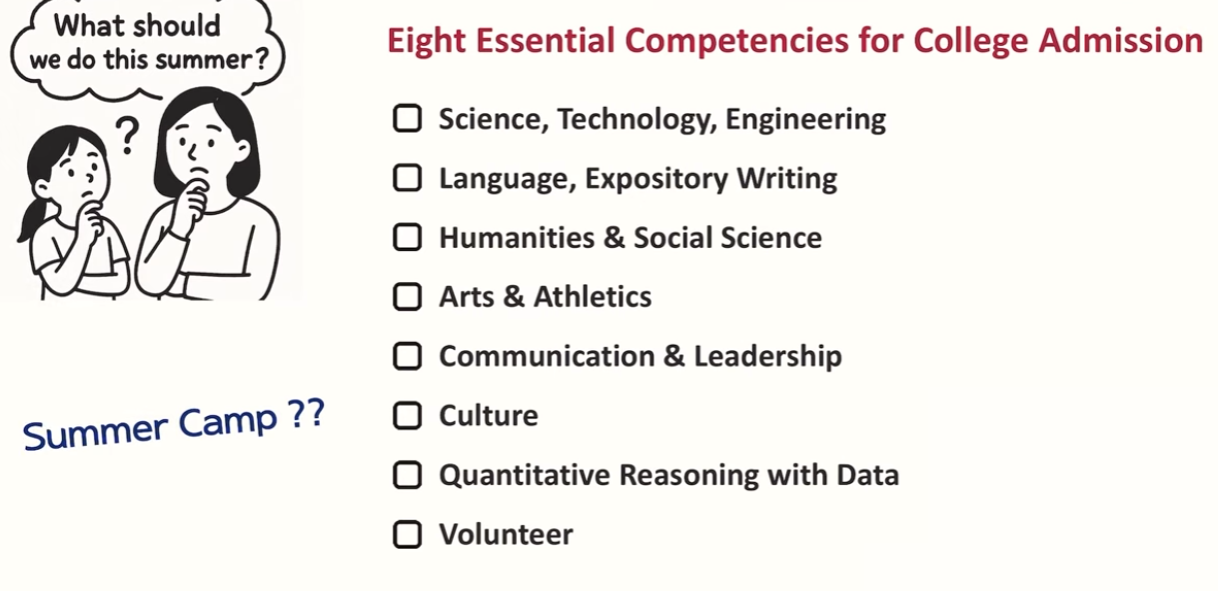
Colleges pay close attention to how students use their summers.
If your original summer plans didn’t work out, it’s crucial to know what kinds of alternative activities you can pursue and how to evaluate them. We’re sharing Part 2 of our Summer Planning series today.
We previously advised that if your initial plans fall through, use these eight essential criteria to choose an alternative path.
We also explained the ten things colleges actually look for in your summer.
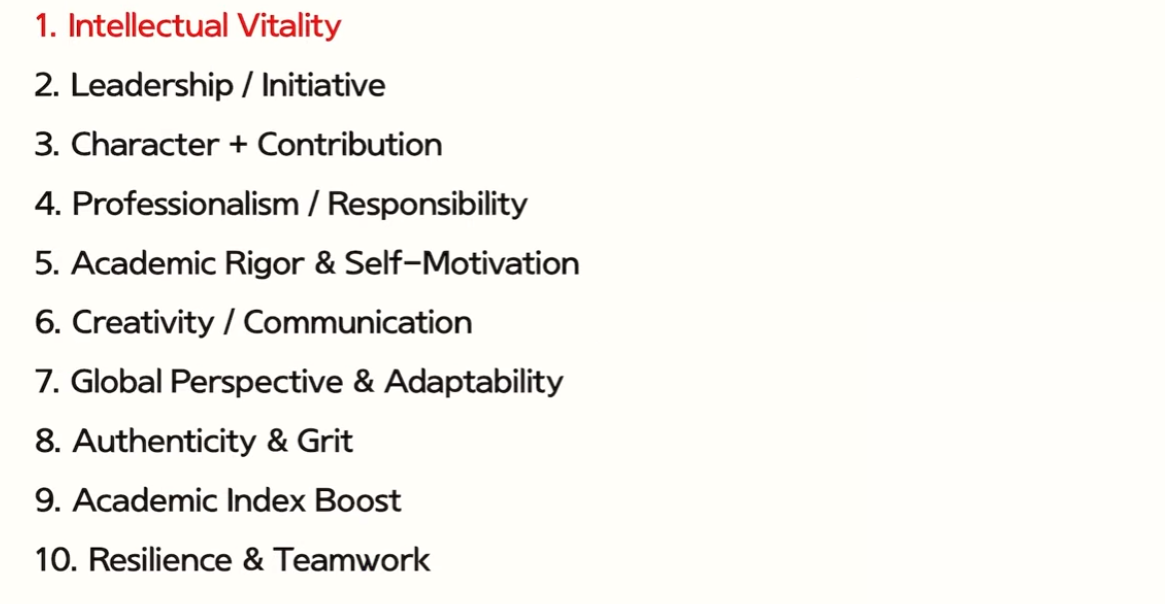
These ten factors are how your summer will be evaluated—so any alternative should be shaped with those principles in mind.
Today, let’s zoom in on the first pillar: Intellectual Vitality.
How do you plan a summer that demonstrates it?
If your student is academically gifted enough to attend elite camps in math, science, or the humanities—that’s fantastic.
These experiences send a clear message to colleges: “This student is deeply motivated and intellectually curious.”
However, what if your child wasn’t accepted, or the program was canceled due to other plans?
Here’s the key insight: It’s not the camp itself that earns praise. It’s that the student used that opportunity to demonstrate intellectual curiosity.
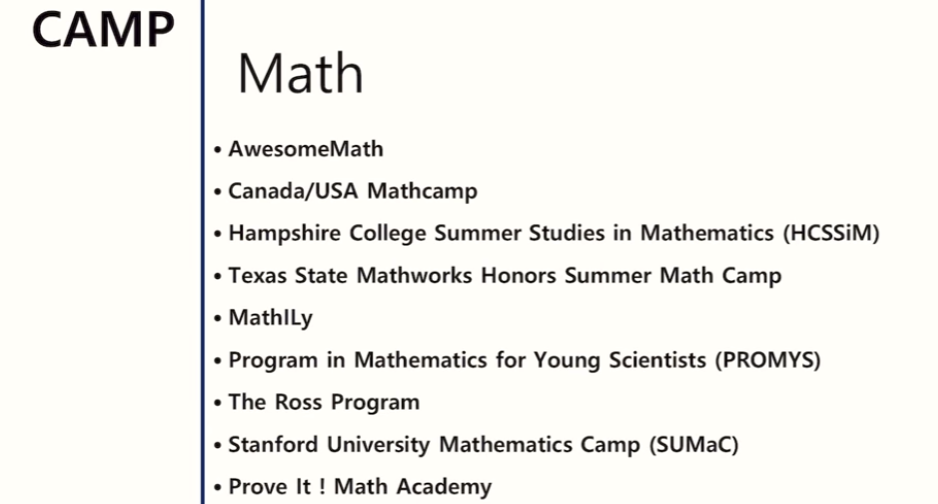
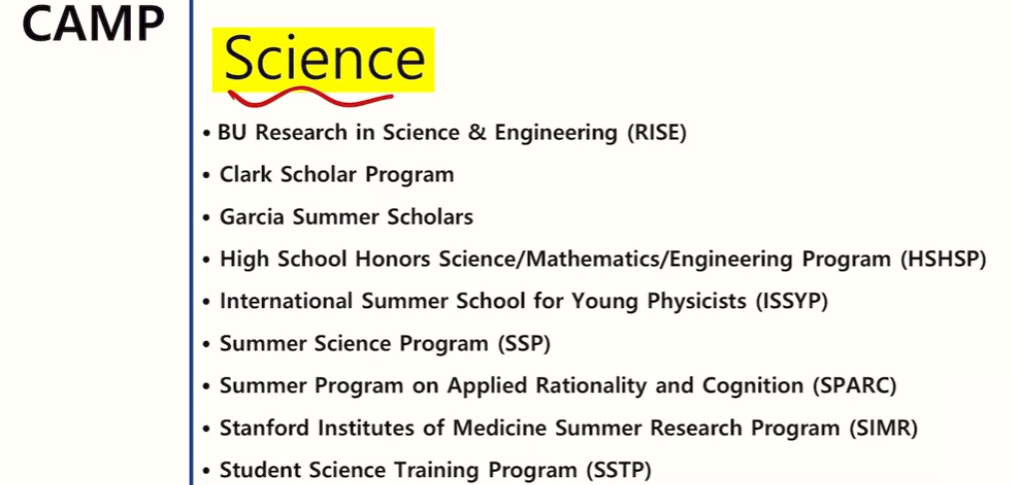
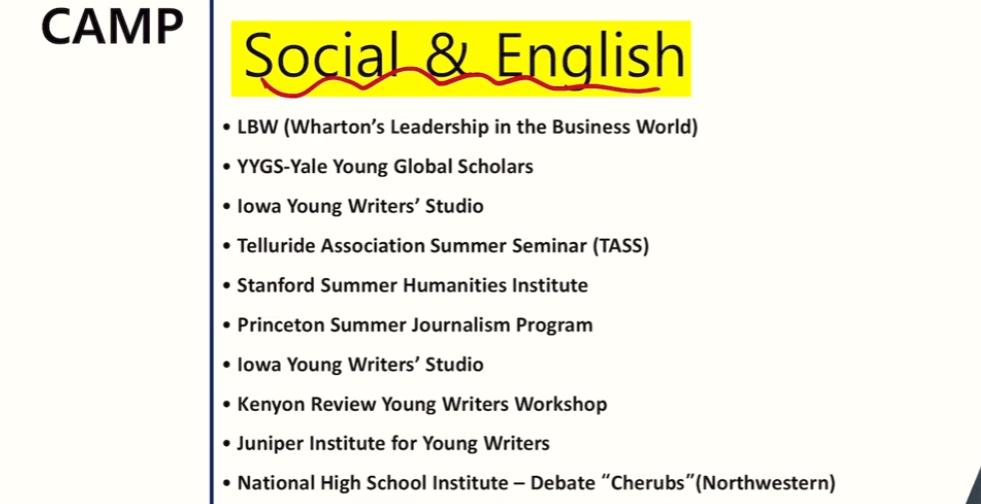
Summer camps are a means, not the goal.
Missing one shouldn’t result in an idle summer. Instead, students should commit to an independent or guided project that continues into the school year.
You can still stand out in college applications by doing work of equal academic weight.
Highly selective competitions like ISEF, JSHS, and the National STEM Festival are great options.
Each varies in intensity:
- ISEF has the heaviest requirements and the latest deadline.
- National STEM Festival is more lightweight and accessible.
When preparing for research-based competitions, getting help from a mentor is ideal.
But even if you’re working independently, we’ll show you how to structure your summer, step by step.
Finding a Research Topic
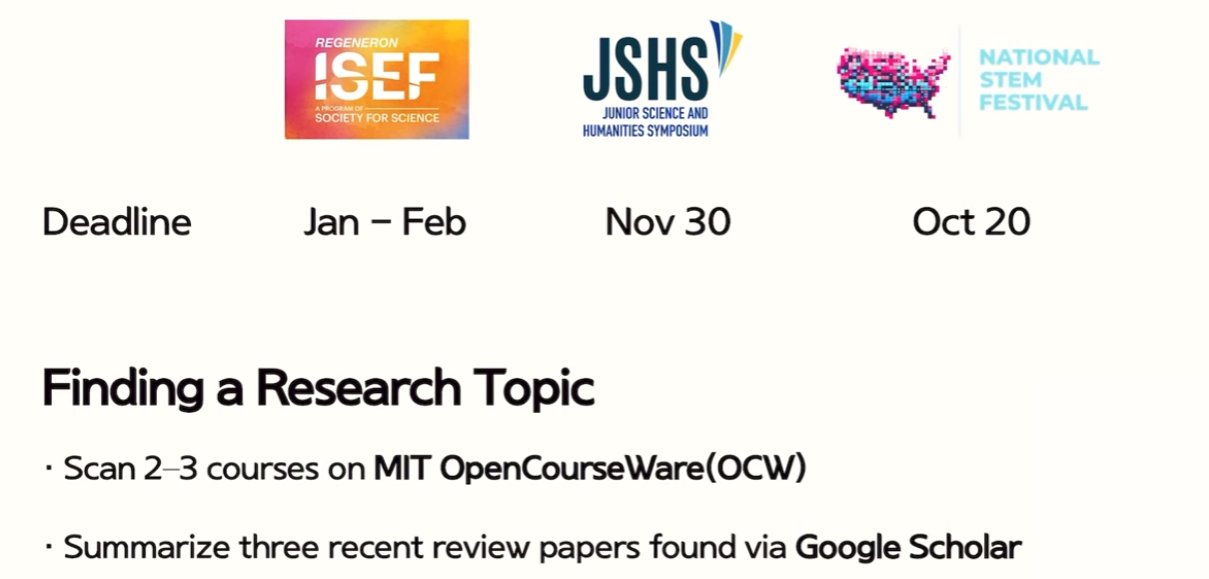
Start with MIT OpenCourseWare (OCW)—an incredible free resource.
Browse and watch 2–3 courses that spark your curiosity.
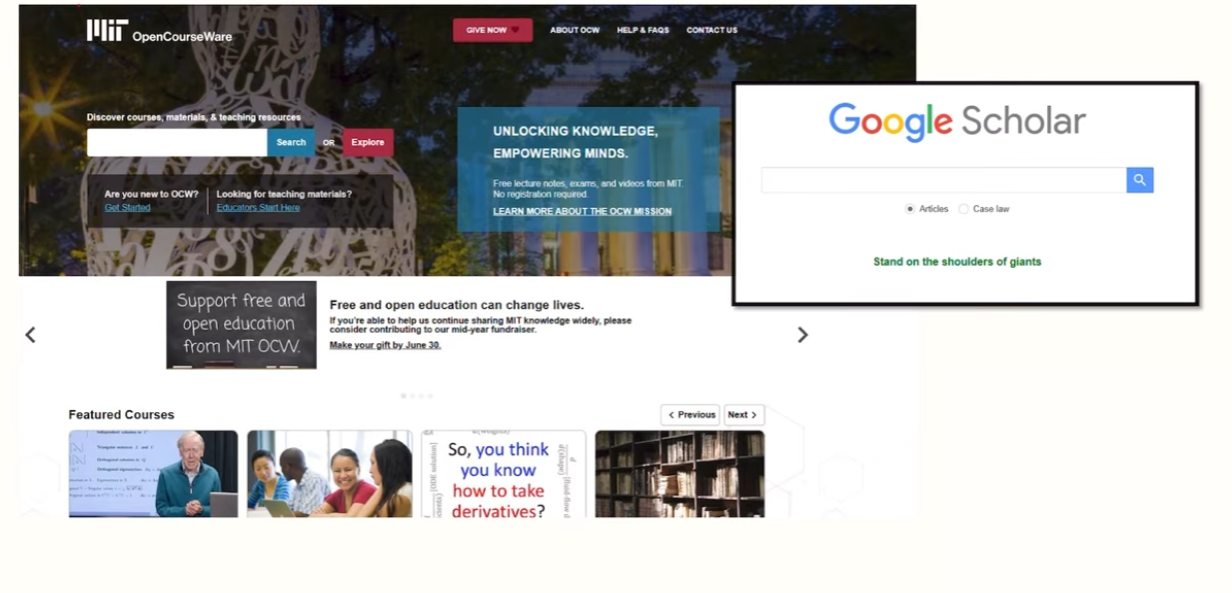
Next, take those topics and search for related research papers on Google Scholar.
Reading through 2–3 academic papers will help you narrow down your focus and form your research question.
So, visit MIT OCW, select relevant lectures, and follow up with literature on Google Scholar.
Week-by-Week Research Competition Plan
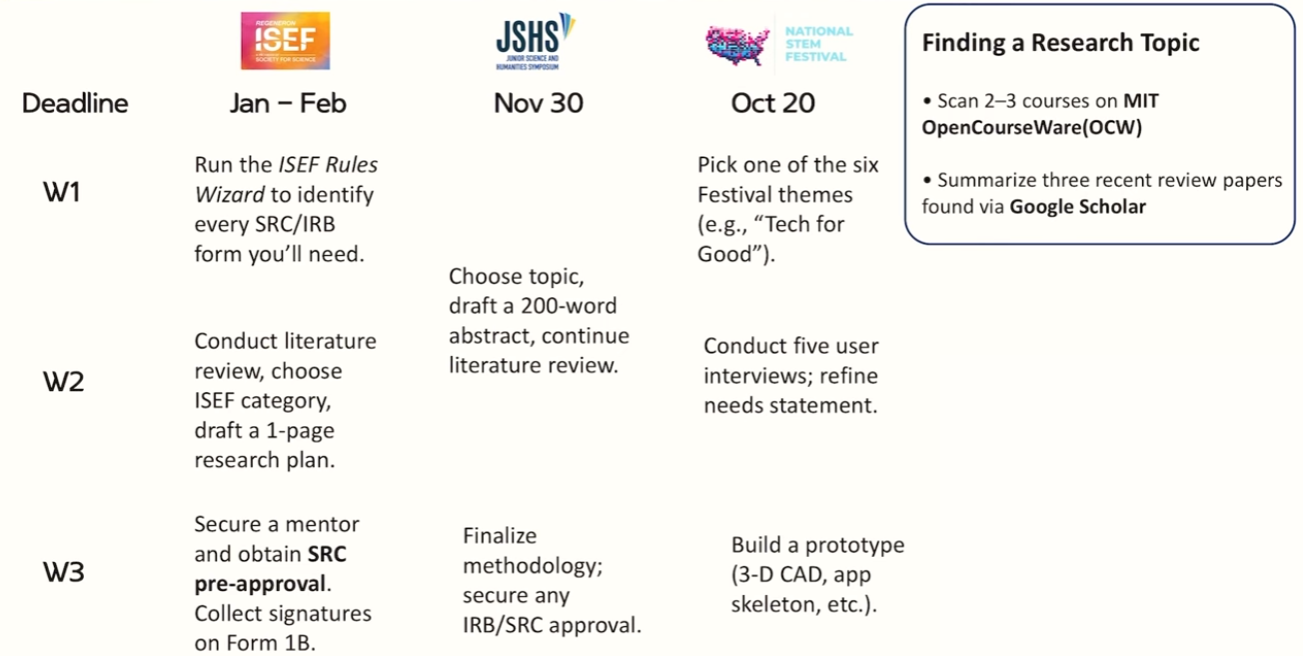
If you're working without a mentor, it's critical to follow a clear timeline. Here’s a sample 8-week plan covering ISEF, JSHS, and the National STEM Festival.
Weeks 1–3
ISEF:
- Week 1: Explore potential research topics and fill out ISEF’s Rules Wizard. Begin identifying which approvals (IRB, SRC) are needed.
- Week 2: Gather references and determine your project category. Draft your research plan.
- Week 3: Submit for SRC/IRB approval. These boards assess ethical concerns and must approve your project before starting.
JSHS:
- Weeks 1–2: Finalize a topic and draft a 200-word abstract (your “Research Plan”).
- Week 3: Seek SRC/IRB approval and fill out Form 1B.
National STEM Festival:
- Weeks 1–3: Choose one of the six available themes. Write a “Definition Statement,” similar to an abstract.
Focus on writing your abstract and completing any approval steps during this time.
⚠️ Since others are attending prestigious camps, it’s especially important that you stay productive.
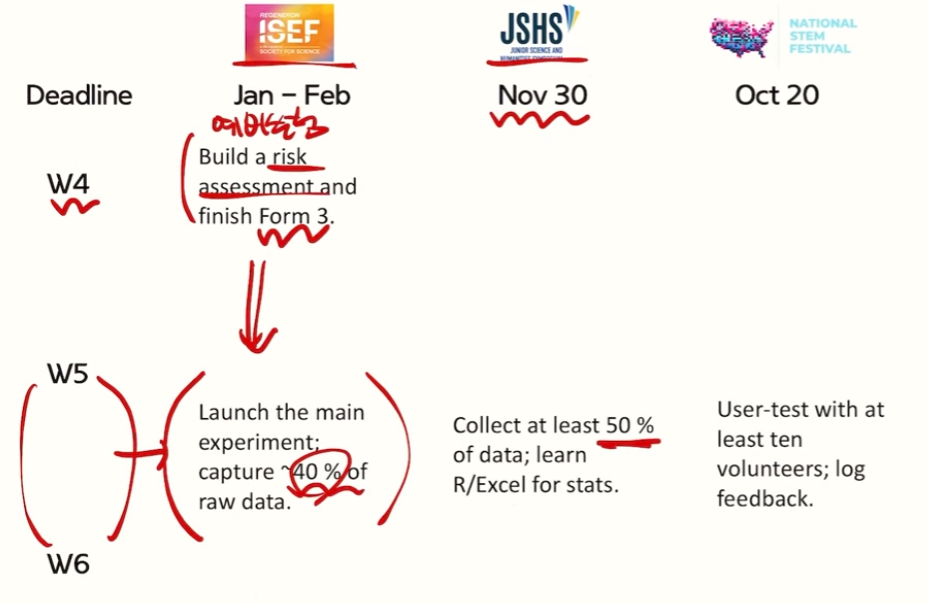
Weeks 4–6
ISEF:
- Week 4: Complete a risk assessment using Form 3.
- Weeks 5–6: Begin experimental work and gather preliminary data.
Working fast is key, especially without a mentor. Try to complete data collection by Week 6.
JSHS:
- Weeks 4–6: Since JSHS deadlines are earlier than ISEF, you should already be halfway through your experiments by Week 5 or 6.
National STEM Festival:
- Weeks 4–6: Conduct interviews with at least five users, build your prototype, and start collecting data from user feedback.
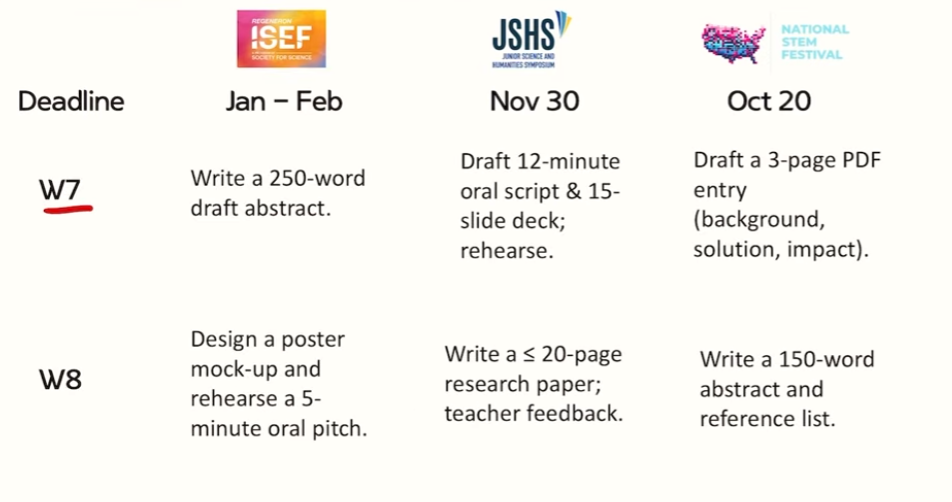
Weeks 7–8
ISEF:
- Week 7: Write a 250-word draft abstract. Start preparing your presentation materials.
- Week 8: Finalize your poster design.
You’ll be busy once school starts, so try to complete as much as possible over the summer. Full experiments, literature reviews, and poster prep can take 3–4 months.
JSHS:
- Week 7: Finalize your 12-minute presentation.
- Week 8: Write your full research paper (~20 pages). Seek feedback from teachers.
National STEM Festival:
- Week 7: Prepare a 3-page PDF report.
- Week 8: Finalize your 150-word abstract and references.
Other Competitive Alternatives
If you missed a prestigious camp, research projects are a strong substitute.
You can also prepare to submit to JEI (Journal of Emerging Investigators) using this same 8-week structure.
MIT THINK Scholars Program (Deadline: Early January)
Hosted by MIT’s TechX, this STEM idea competition doesn’t require you to complete your research.
Just present a strong proposal, and MIT will offer mentorship and funding if selected.
- Weeks 1–2: Read winning samples. Summarize 5–7 academic papers and define your research gap.
- Weeks 3–4: Draft your proposal and request feedback from two PhD candidates or professors.
- Weeks 5–6: Edit and refine your proposal. Record a 90-second pitch video.
- Weeks 7–8: Run plagiarism checks and submit your final materials.
It’s possible to do this alone—just visit the official website for details.
Kaggle Secondary School Competitions
Kaggle is a data science platform where students can participate in real-world machine learning competitions.
- Weeks 1–2: Take a beginner machine learning course. Study 3 winning solutions from past competitions.
- Weeks 3–4: Download past datasets and practice cross-validation.
Create a GitHub account to archive your code—it’ll be a great asset for college applications. - Weeks 5–6: Recruit a teammate (up to two allowed).
Weeks 7–8: Use tools like Optuna to optimize hyperparameters.
Students with coding experience can benefit greatly from these events.
The Concord Review (TCR)
This publication accepts only the most rigorous historical research by high school students. Deadlines are quarterly, so this is a long-term project.
- Weeks 1–2: Choose a topic before 1991—this ensures access to primary sources.
- Weeks 3–4: Use the Zotero library tool to manage citations and references.
- Weeks 5–6: Write 1,200 words per day. Focus on quantity first; quality comes during revision.
- Weeks 7–8: Get feedback from a history teacher and incorporate edits.
Additional Enrichment Programs that Showcase Intellectual Curiosity:
- John Locke Institute Essay Competition
- Davidson Fellows Scholarship (Individual Research or Portfolio)
- Boston University RISE Internship & Practicum
- Simons Summer Research Program (Stony Brook University)
- National History Day Contest – Senior Paper/Documentary Division
- New York Academy of Sciences "Junior Academy" Global Research Challenges
- AFSA National High School Essay Contest
- NCTE Achievement Awards in Writing
- NCWIT Aspirations in Computing Award
- Columbia University SHAPE (Summer High School Academic Program for Engineers)
Don’t feel discouraged if your child missed a summer camp. It does not mean they’ve lost their chance to shine.
Make the most of the summer by committing to one of these high-impact alternatives and building toward your goals.
We hope today’s post gave you insight into strong academic replacements for missed summer camps.
If you have questions or would like guidance tailored to your student, please contact A-ONE INSTITUTE.
Thank you.
summercamp
ISEF
Concord Review
MIT OpenCourseWare
JSHS
National STEM Festival
MIT THINK Scholars Program
Kaggle Secondary School Competitions